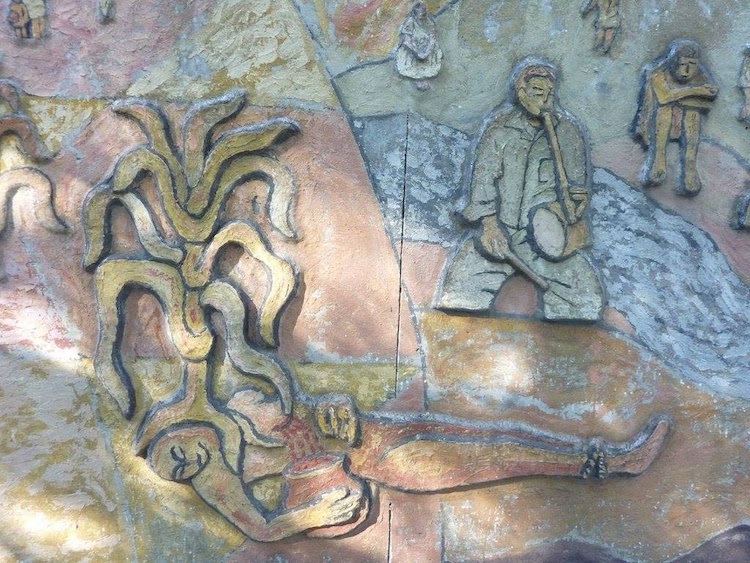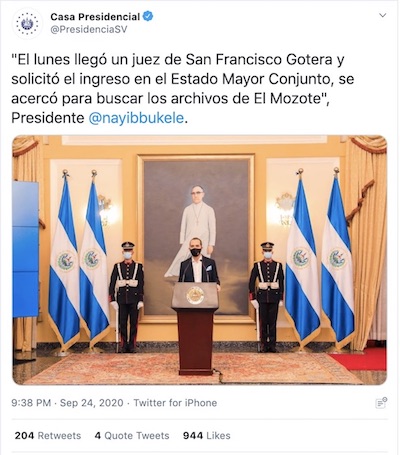Let's Talk Human Rights

El Mozote: "Peace is the Product of Justice and Love"
In 2019, the Human Rights Center granted the Romero Human Rights award to three Salvadoran lawyers - David Morales, Ovidio Mauricio, and Wilfredo Medrano Aguilar - for their work in seeking justice for the victims in the case of El Mozote in El Salvador. The 1981 massacre at El Mozote, part of a larger scorched-earth counterinsurgency campaign, involved the systematic murder of nearly a thousand civilians, over half of whom were children.
Actions taken by the government of El Salvador within the past week may threaten the progress of this important ongoing human rights court case. On Monday September 21, an inspection of military archives was supposed to take place, as ordered by the judge overseeing the judicial investigation. The formal case against military leaders for ordering the massacre had been brought to Salvadoran courts at long last in 2016, after a post-war amnesty law was overturned.
The court case represents an important step in the country’s post-war process of transitional justice, and bears enormous political and historical significance as it may lead to accountability for the largest episode of state-sponsored killing in the Americas in modern times. An end to impunity for past crimes is critical for the victims of El Mozote and for confirming the path of the country towards a more peaceful, inclusive, and just society. As Saint Romero said, “Peace is the product of justice and love.”
The promise of reconciling El Salvador’s difficult past is matched by the fragility of the ongoing legal process, as the events of this week have shown. Instead of complying with the court-ordered search of the long-sealed archives, the Salvadoran military blocked Judge Guzmán from accessing the building. Despite his promises to victims early in his administration, President Nayib Bukele has supported the military’s action, stating in a press conference on Friday night that “Military archives are not revealed anywhere in the world, they are protected by constitutional right.”

In the press conference, President Bukele stood in front of a life-sized portrait of Saint Oscar Romero, the country’s former archbishop who had openly denounced state violence and called for military accountability. Archbishop Romero was martyred in 1980, shot while performing mass shortly after he appealed directly to soldiers in the Salvadoran military to “stop the repression.”
No one is above the law, including the Ministry of Defense of the Government of El Salvador. The victims of the massacre at El Mozote have been waiting decades for an accounting in their case. They and their surviving relatives have a right to the truth.
In reaffirmation of our commitment to the life and legacy of Saint Romero, we join the Organization of American States, the Washington Office on Latin America, and Salvadoran human rights-defending organizations including Tutela Legal, Cristosal, the Pro-Búsqueda Association for disappeared children, the Coordinadora Salvadoreña de Movimientos Populares, the Salvadoran Network of Human Rights Defenders, and the Institute for Human Rights of the Central American University (IDHUCA) in calling for transparency in pursuit of justice for the victims of the massacre at El Mozote.
This would require the Salvadoran government to:
- Provide access to military archives as mandated by the courts.
- Desist from any further obstruction of the investigation.
- Guarantee full protection for the judge and, as appropriate, lawyers involved in the case.
Additionally, the U.S. government should:
- Declassify and provide to the Salvadoran court any U.S. military files related to the El Mozote massacre and the larger counterinsurgency campaign in which the massacre took place.
- Utilize diplomatic pressure to ensure that the Salvadoran government complies with the rule of law in this important case.
Image credit: © 2017 Miranda Cady Hallett, Detail from the Monumento a Justicia y la Verdad in San Salvador, a monument to the civilian victims of the Salvadoran civil war, including those who died in El Mozote
